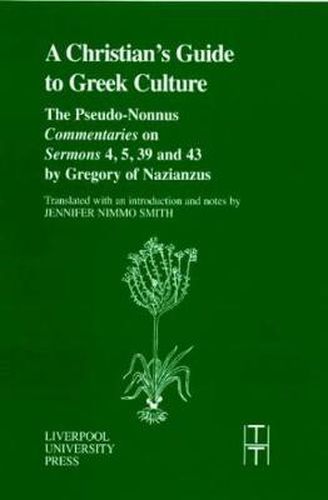Readings Newsletter
Become a Readings Member to make your shopping experience even easier.
Sign in or sign up for free!
You’re not far away from qualifying for FREE standard shipping within Australia
You’ve qualified for FREE standard shipping within Australia
The cart is loading…






Composed by Gregory of Nazianus in the fourth century, sermons four, five, 39, and 43 are remarkable for their large number of classical allusions. They reflect Gregory’s determination, shared by many other Christians both before and after him, to preserve the useful aspects of Greek learning for the service of the church in a world where a pagan system of education still held power. Less than two centuries earlier, the work of the unkonwn commentator which is translated here highlights the survival of Greek learning in these same sermons, albeit in an artless and elementary way. In sharp contrast to the style of Gregory, the commentator (thought to have come from the Eastern Mediterranean) used a basic technique of the schools to compose his work. His commentaries are but collections and explanations of the majority of Gregory’s classical references in these sermons. Some of his explanations are inadequate, while others are confused or incorrect. All are nevertheless written in the smae unpretentious, immediately identifiable and confident style. Historically and culturally invaluable, they present us with an insight into one Christian’s attitude to the interface between Greek literature and pagan beliefs in an increasingly Christianised world.
$9.00 standard shipping within Australia
FREE standard shipping within Australia for orders over $100.00
Express & International shipping calculated at checkout
Composed by Gregory of Nazianus in the fourth century, sermons four, five, 39, and 43 are remarkable for their large number of classical allusions. They reflect Gregory’s determination, shared by many other Christians both before and after him, to preserve the useful aspects of Greek learning for the service of the church in a world where a pagan system of education still held power. Less than two centuries earlier, the work of the unkonwn commentator which is translated here highlights the survival of Greek learning in these same sermons, albeit in an artless and elementary way. In sharp contrast to the style of Gregory, the commentator (thought to have come from the Eastern Mediterranean) used a basic technique of the schools to compose his work. His commentaries are but collections and explanations of the majority of Gregory’s classical references in these sermons. Some of his explanations are inadequate, while others are confused or incorrect. All are nevertheless written in the smae unpretentious, immediately identifiable and confident style. Historically and culturally invaluable, they present us with an insight into one Christian’s attitude to the interface between Greek literature and pagan beliefs in an increasingly Christianised world.